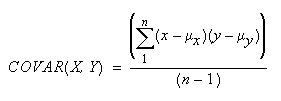Summary
This function returns the covariance, which is the average of the products of deviations for each data point pair in two sets of numbers.
Syntax
COVAR(array1,array2)
Arguments
The two arrays of data in the arguments of this function should meet these criteria:
- The data should contain numbers, names, arrays, or references that are numeric. If some cells do not contain numeric data, they are ignored.
- The data sets should be the same size, with the same number of data points.
- The data sets should not be empty, nor should the standard deviation of their values equal zero.
Remarks
Use this covariance function to determine the relationship between two sets of data. For example, you can examine whether greater income accompanies greater levels of education in a population.
The covariance is calculated as follows, where n is the size of the arrays and mu is the mean.

Data Types
Accepts arrays of numeric data for both arguments. Returns numeric data.
Examples
COVAR(J2:J5,L2:L5)
COVAR(R2C12:R15C12,R2C14:R15C14)
COVAR({7,5,6},{7,4,4}) gives the result 1
COVAR({5,10,15,20,25},{4,8,16,32,64}) gives the result 144